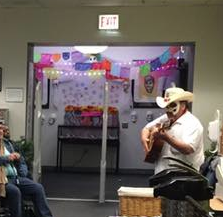On display from
Wednesday, October 12, 2016 until Wednesday, November 23, 2016
Library Entrance
at Columbia College Chicago (CCC)
624 S. Michigan
Ave., 1st floor
Chicago, IL
60605-1996
Monday-Thursday 8:00 am - 10:00 pm
Friday 8:00
am - 6:00 pm
Saturday 9:00
am - 5:00 pm
Sunday Noon - 5:00 pm
We welcome you to view these artist books, “one of a kind”
creations in the entrance area of Columbia College Chicago’s (CCC) Library.
These artistic creations are examples of what resulted from the course, “LATIN
AMERICAN ART, LITERATURE AND MUSIC”. Alongside student's projects is a colorful
community "ofrenda" inspired by the Mexican holiday, "Dias de
los Muertos" holiday. At its opening reception on Oct. 12th,
Jesus "Chuy" Negrete, director of the Mexican Cultural Institute sang
"corridos" which was co-sponsored by CCC's Office of International
Student Affairs.
Their community "ofrenda" inspired by Mexican
traditional altars, complete with candles and yellow-orange "
cempazuchitl" flowers. These traditions can be seen as Catholic but are in
fact linked to Central America and Mexico’s Maya and Mexica (Aztec) beliefs.
Color plays a festive role in remembering the dead; "papel picado" (a
colorful paper art banner) is present with butterflies symbolizing regeneration
and transformation, within Pre-Columbian beliefs that it represents past souls.
CCC's HHSS Dept. Instructor,
Jesus Macarena-Avila states: "We have been studying the cultural
development of Meso-America looking at their literary traditions. Each student
created a codex, an accordion-folding book that speaks about cultural
identities making references to Maya and Mexica traditions. Codices represent
“first voices” but reclaims history and passion while making cultural
connections to each other.
In this ofrenda (in tradition of
having images and names of remembered people) are written names placed on wall
plus portraits representing Mexican American historic figures: Felix Longoria
(1920-1945) and Emma Tenayuca (1916-1999).
Longoria died in WWII, his body was returned back to Texas where his family was
refused burial services because he was of Mexican descent and Tenayuca became a
labor organizer for the pecan picker unions in San Antonio, Texas."


No comments:
Post a Comment